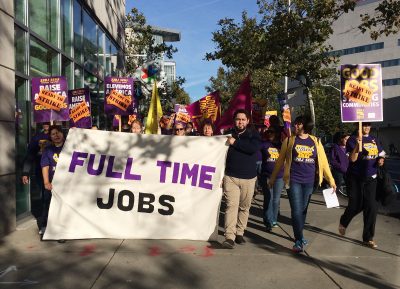
Approximately 1,000 janitors in the Service Employees International Union Local 32BJ rallied on Berkeley and Boylston streets Saturday, demanding a commercial cleaning contract revision. Discussions between the union and employers have continued through this week, according to the union’s spokesperson Eugenio Villasante.
According to Villasante, the union members are calling for fair wages, improved healthcare insurance and job security clauses in their contracts. If members don’t reach agreement with the Maintenance Contractors of New England by Friday, the union will call a strike again, according to a Saturday press release from the union.
“The market can definitely support more full-time jobs,” Villasante said. “Often, employers will hire two part-time jobs instead of one full-time, just to keep the cut for healthcare.”
According to the union’s press release, negotiations between MCNE and the union began last August.
“[The union is] the largest property service union in the country and a consortium of the largest contractors in the industry,” the release stated. “Major issues include fair wage increases to keep up with the rising cost of living and protections against unreasonable workloads.”
The MCNE said in a Saturday statement that the strike vote was unnecessary. In a Tuesday statement, the contractor group said they and the union have continued to have several discussions in the past week, and as of Wednesday, the contractor group was waiting on counter-proposals by the union.
“We believe real progress was made on economic issues like wages and health care,” the MCNE said in the Saturday release. “… The MCNE is confident a fair and reasonable settlement can and be reached without a strike or the threat of one.”
According to the union, there are approximately 12,000 janitors working under contract with the MCNE, and they clean about 2,000 office buildings across Boston.
Prisca Castanyer, an economics professor at Northeastern University, wrote in an email that universities have been laying off janitors, and companies have been cutting healthcare benefits.
“Janitors are mostly migrants; it’s not only from race but also gender,” Castanyer said. “Most of us don’t think twice that somebody’s cleaning up after them. It’s sad that they have to make presence known by going on strike.”
Kamran Dadkhah, an economics professor at Northeastern, wrote in an email the impact of the laborers’ strike depends on several factors, such as the number of workers in the strike, the nature of their work and “the determination and ability of employers to withstand the strike.”
“If there is a strike, it may take some time for its effects to be felt in the buildings affected, while the effect on the low income workers may be too much,” Kamran wrote. “As a result, the employers may think that they can pressure the workers by resisting a compromise. In that case it may take a few weeks before both sides feel that the game is not worth the candle.”
Several Boston residents said they understand why the janitors are striking, since the working conditions of the workers tend to be difficult.
James Kinkaid, 28, of Brighton, said the strike is reflective of the unsatisfactory conditions the workers face.
“I’d imagine it would make it harder for the city to run,” he said. “It seems like a tough situation. If they’re striking, I’d imagine there are some unfair conditions.”
Robin Williams, 54, of Dorchester, said companies will understand more about the janitors’ living conditions through the strike.
“Eventually, they are going to have to meet their demands,” she said. “It has to come to a certain type of compromise. They’re going to see exactly why they’re on strike.”
Marlon Green, 35, of Dorchester, said there is room for improvement for the janitors, who work “in some difficult areas.”
“I do support them since it’s been awhile,” he said. “Specifically, there were incidents when the hours for the other janitors have been cut in an effort to the other city to not pay health insurance.”





















































































































